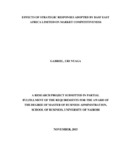| dc.description.abstract | Dynamic environment changes impact on organizations goals and objectives and this makes it difficult for organizations to remain viable. To be able therefore to stay ahead of competition, it is imperative for the organizations to continually scan the environment so that the organizations adjust their strategic responses to address the demands of the environment. The appropriate response strategies guarantee a competitive edge that ensures the organizations remain relevant. The study was set to establish the effects of strategic responses adapted by BASF East Africa Limited to increased competitive conditions in the market with the changes in the agrichemical industry. The study adopted a case study design. Primary data obtained was qualitative and was collected by the use of interview guides which was administered to the correspondents face to face. The interview respondents were the regional manager for East Africa, marketing manager and the country managers for Kenya, Uganda and Tanzania. Data collected was analyzed by way of content analysis. The major findings of the study were that strategic responses which are well developed and appropriately adopted are powerful tools. It is evident that BASF East Africa Limited has responded to the challenges arising from the competitive conditions in the market. BASF East Africa Limited needs to be more diligent in environment scanning and be proactive in formulating strategies that meet and preempt any anticipated adverse changes spinning out of its operating environment. Dynamic environment changes impact on organizations goals and objectives and this makes it difficult for organizations to remain viable. To be able therefore to stay ahead of competition, it’s imperative for the organizations to continually scan the environment so that the organizations adjust their strategic responses to accommodate the demands of the environment. The study recommended that in order to stay ahead of competition, commercial banks should continuously scan the environment aggressively and speed up implementation of various strategies. The study similarly did not consider the process of implementing the strategic responses adopted by the organization as a whole but focused on strategic responses adopted by the organization in increasing competitive conditions in the market. This is a limitation since it ought to have considered the strategy responses process as a whole. That is, from strategic objectives setting, planning, analysis and choice, implementation and evaluation. Thirdly, the study did not consider the role of regulation and policy framework in the manufacturing industry in increasing competitive conditions in the industry hence serving as a limitation. A study can be carried out to establish whether strategic responses in the manufacturing firms in Kenya are similar. This will give an indication of responses made by the manufacturing firms in Kenya to their changing competitive situation and hence allow industry generalizations to be made. These generalizations can be used as assumptions by prospective new market entrants and other scholars. The researcher suggests that a similar study can be conducted to establish strategic responses in other industries or sectors to have a comparison of results and also establish the different strategic responses that are adopted by other industries. | en_US |

